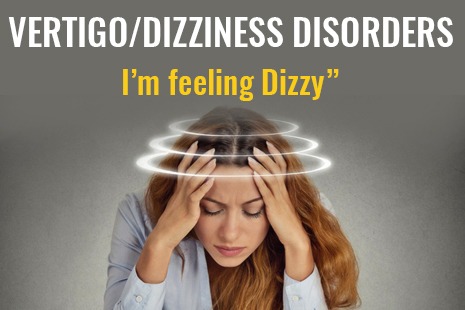Have you felt dizzy while working or working out lately? Hence coming up with a common phrase “I’m feeling dizzy today”!!
Read to know if you’re dealing with an attack of vertigo and what you can do about it.
WHAT IS VERTIGO?
Vertigo is a sensation of feeling off balance you might feel like you or the world around you is spinning. Vertigo is medically different from light-headedness, and unsteadiness; it involves the sensation of movement.
WHY DOES A VERTIGO ATTACK OCCUR? WHAT CAUSES VERTIGO?
Vertigo can occur due to many reasons. The inner ear, which controls the balance of the body, is the most common area to be affected. The inner ear contains a liquid called endolymph and calcium carbonate crystals which are responsible for maintaining the equilibrium of the body. Changes in the endolymph pressure, displacement of calcium crystals and inflammation of the balance nerve are the most common causes of vertigo due to inner ear.
Disorders related to blood pressure fluctuations, anemia, uncontrolled diabetes etc. can also cause dizziness like symptoms then contact to ent specialist.
Sometimes vertigo and balance problems are due to disorders of the nervous system like vestibular migraine or strokes. So every case of vertigo should be evaluated to find the underlying cause.
What should I do when an attack of vertigo happens?
First and foremost is that YOU DON’T PANIC!!!!!
Sit or lie someplace so that you don’t fall once the attack has started.
Try and make a note of how long the episode lasted, what initiated the episode, was there any ringing noise in the ears, and was it accompanied with nausea / episodes of vomiting as all such information should be relayed to the ent doctors which in turn shall help in diagnosing and then treating the problem.
WHEN SHOULD I SEE A DOCTOR?
If the symptoms of spinning sensation do not settle within a day.
Recurrent episodes
Incapacitating spells
URGENT- blurring of vision, severe headache, slurring of speech, weakness in any part of the body.
WHAT DISORDERS CAN CAUSE VERTIGO?
Most common condition causing vertigo is BPPV- Benign Paroxysmal Positional Vertigo where calcium salt crystals are displaced from the fluid filled canals in the inner ear thus causing vertigo on sudden head movements.
Others can be- Meniere’s disease, Vestibular Neuritis, Labrynthitis, and Vestibular Migraine.
WHAT ARE THE TREATMENT PATHS AVAILABLE FOR VERTIGO?
For some, cases treatment is needed and they may include:
- Vestibular rehabilitation – A physical therapy that is aimed at strengthening the vestibular system (this is the system that sends signals to the brain about body movements relative to gravity and helps to keep your balance)
- Canalith repositioning manoeuvres – This is a kind of therapy that recommends a series of head and body movements that help move the calcium deposits out of the canal into an inner ear chamber so they can be absorbed by the body.
- Medicine – This usually helps controls symptoms like nausea or motion sickness associated with vertigo. Also, if vertigo is caused by an infection or inflammation, antibiotics or steroids may reduce swelling and cure the infection.
- Surgery – If vertigo is caused by a more serious underlying problem, such as a tumor or injury to the brain or neck, surgery may be recommended by ent doctor.

